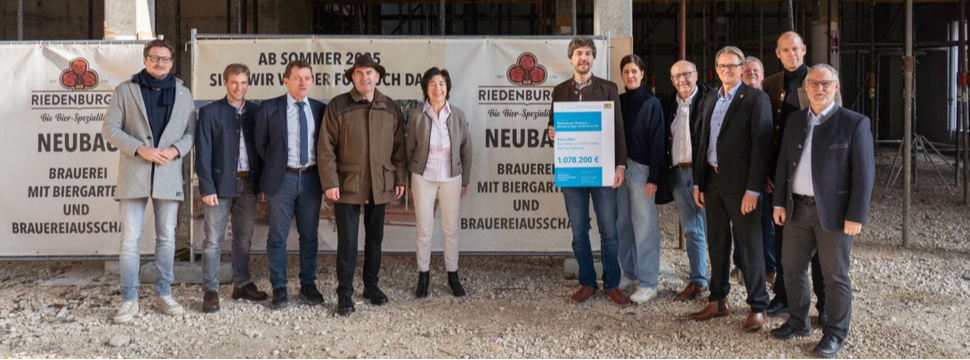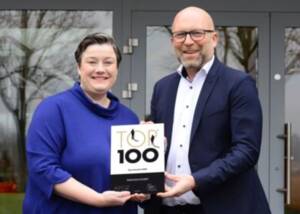Riedenburger Brauhaus implements world first in energy efficiency: Bavarian Minister of Economic Affairs hands over the funding decision
News General news
Riedenburger Brauhaus is setting another milestone on its way to becoming a sustainable brewery: the official handover of the grant by Hubert Aiwanger, Bavarian State Minister for Economic Affairs, Regional Development and Energy, will make it possible to implement a unique energy concept. With funding of around one million euros from the Bavarian Energy Research Program, the traditional organic brewery will be transformed into one of the most energy-efficient breweries in the world - and completely without the use of fossil fuels.

“Without this funding, it would not have been possible for us to use these advanced technologies right now,” explains Maximilian Krieger, Managing Director of Riedenburger Brauhaus. “We are proving that tradition and innovation are not opposites, but together pave the way for sustainable and climate-neutral beer production. Our aim is not only to inspire beer lovers, but also to show that environmental protection and economic success can go hand in hand. With this project, we are setting new standards for the future of the brewing industry.”
An energy concept in a class of its own
At the heart of the new concept is the Exergon Brew® Eco System from plant manufacturer banke GmbH. This stores waste heat from production in energy storage units and converts it into usable energy (up to 95°C) using a heat pump powered by the brewery's own solar energy. A vacuum vapor recompression system, unique in the world in this combination, generates steam above 100°C. The result is impressive: the energy requirement for beer production is reduced by up to two thirds. At the same time, the entire production process will no longer require fossil fuels in future. This will reduce CO2 emissions from the current 120 kg to 0 kg per 1,000 liters of beer - a pioneering step not only for the beverage industry, but also for the food industry as a whole. “With the Riedenburger Brauhaus, we are setting a new benchmark for sustainable brewing technology. This project impressively demonstrates how innovation and technical excellence can drive decarbonization in the food industry. We are proud to be working with such a visionary partner to realize a truly pioneering achievement,” says Friedrich Banke, Managing Director of banke GmbH.
Scientific support and technical expertise
This ambitious project is being developed and implemented in close cooperation with banke GmbH, which is developing the energy concept and supplying the systems, and under the scientific supervision of Prof. Dr.-Ing. Markus Brautsch from the Institute for Energy Technology (IfE) at OTH Amberg-Weiden.
A signal for the future
“The energy transition will only work with clever ideas and new technologies. The Riedenburger Brauhaus is leading the way. From next year, CO2 emissions are to be reduced from the current 120 kilograms per 1000 liters of beer to zero. I am delighted that a medium-sized brewery is leading the way with a spirit of discovery and fresh ideas and is exploiting the enormous potential for savings. It could become a role model for many other breweries in Bavaria that are wondering how to proceed. This is precisely why we are supporting the Krieger family in their project,” explained Bavaria's Minister of Economic Affairs Hubert Aiwanger, underlining the importance of innovation as a driver of a climate-neutral economy.
But for Riedenburger Brauhaus, sustainable management goes beyond saving energy. Maximilian Krieger emphasized the company's holistic responsibility: “We think about environmental protection in a sustainable way - not only in terms of energy, but also in good cooperation with our organic farmers. By building up humus and protecting water, they make a decisive contribution to regenerating the soil and maintaining water quality. Because: good water is the basis for good beer!”
The technology is expected to be installed in mid-2025, with the first brew planned for the summer. Visitors will soon be able to experience first-hand how the beer of the future will be brewed to the highest environmental standards - another step towards steering the world of beer in a more sustainable direction.










